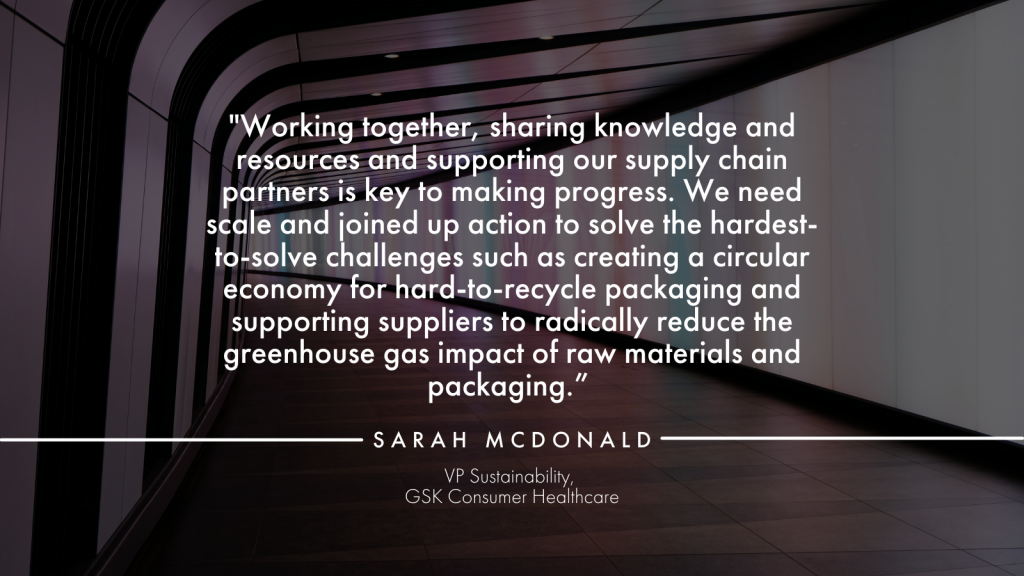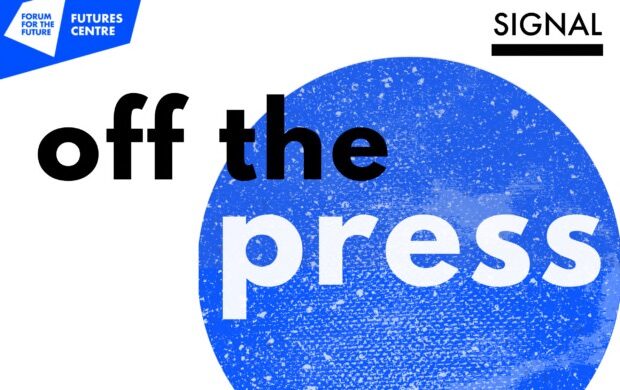For the latest in Forum’s Future of Sustainability series, we’re putting the spotlight on big business perspectives. Here, senior leaders from our partners 3M, Bupa, GSK Consumer Healthcare and Target, share their reflections on the last 25 years of sustainability and their personal take on the most valuable lessons learned along the way.
With over a century of business experience between them, these four leaders shared similar views on the progress made and the big shifts in terms of mainstreaming sustainability. They come with different perspectives on the biggest gaps so far – from data to inequality – and on their biggest lessons – from collaboration, to mindset, to methods for inspiring different audiences.
About the contributors:
All opinions expressed by the contributors to this piece are their own and do not necessarily reflect the position of Forum for the Future.
On key areas of progress in the last 25 years of the sustainability movement:
Many of the leaders emphasise the tremendous shift in awareness and knowledge over the past quarter-century, with sustainability issues moving from the fringes of society or siloed corporate functions into the mainstream and corporate boardrooms. In celebrating progress, the key areas they highlight are: scientific insights and more transparent measurement methods enabling robust and informed decision-making; sustainability being firmly on the agenda across university courses, investors and media; and increased awareness of key issues and higher expectations from consumers and other stakeholders. The group agrees that the case for urgent action – as well as the scale and interlinked nature of the challenges ahead – are widely understood and highlights the increased focus on integrated action, co-creation and collaboration – within a business, with key partners and across the sustainability movement.




On the gaps remaining:
Despite these significant advances, the leaders point to a diverse set of gaps or areas where they each feel the sustainability movement has fallen short – from the need for specific data to the need for more human framing and the failure to address inequality
Dr. Schueller of 3M highlights that access to data is a major hindrance to informed decision-making and collective action.
“I see the biggest gap today as access to accurate, appropriately detailed data for decision-making. Progress is being made, but truly informed decisions on raw material selection, source of supply, manufacturing processes, equipment, and locations, and optimizing overall product portfolios all remain limited by the accuracy of understanding detailed data to inform which of many options is the best.”
Dr. Schueller, 3M
Bupa’s Sullivan calls out that, while sustainability is fundamentally a human story, and “a story of innovation, ingenuity, and survival”, the current framing and communication is all too often detached, impersonal and technical. He argues that:
“We must make sure that sustainability is grounded in a way that is people-focused. We need the communications and behavioural change specialists to work hand in hand with the sustainability experts and scientists to make the story relevant to people so that they understand it and act on it.”
Sullivan, Bupa
Sullivan and McDonald both reflect on the critical interconnectedness between people’s health today and the climate crisis. These twin challenges have traditionally not received enough attention, argues Sullivan (Bupa), however, he points out that this is starting to shift, and that “mobilising the healthcare community to raise awareness about the health urgency to tackle the climate crisis could be powerful to drive change for healthy people and a healthy planet.”
Elsewhere, McDonald calls out inequality as a particular gap, as evidenced so clearly through the COVID-19 pandemic over the last two years.
“Covid reminded us that access to and understanding of health is not always equal, with vulnerable groups in society who already experience inequalities being disproportionately impacted.”
McDonald, GSK Consumer Healthcare
McDonald shares examples of BAME communities in the US being significantly more affected by infection rates and death rates, but also that the pandemic led to “women doing nearly 3 x as much unpaid care and domestic work as men […], driven by school closures, stretched healthcare systems and the suspension of social support services.”
On the biggest shifts within the sustainability movement:
While the group acknowledges that there is still lots more to do, one of the biggest shifts within the sustainability movement has been that sustainability is now a mainstream issue.
According to 3M’s Dr. Schueller, it is now “much more pervasive across all geographies, age groups, and socioeconomic groups. Our collective global challenges have become increasingly clear, immediate, and extreme.” She also highlights that the discourse has shifted from whether and ‘why’ action is needed, to “engaging each other on how we can act together to make the greatest impact”.
Echoing this reflection, Bupa’s Sullivan adds that “whilst there’s still a long way to go, there’s momentum, focus and determination to act on this agenda holistically like never before.” For businesses, Sullivan argues, it’s now clear that “having sustainability at the core of their strategy goes beyond moral responsibility: there is a strong business case for doing so, in order to ensure success in the long-term, building resilience, reduce risks, increase employee engagement, improve retention, attract talent and meet customers’ expectations.”
Drawing on her experience at GSK Consumer Healthcare, McDonald, shares that
“Tackling these issues is not just important for planetary and human health, but also really matters to our stakeholders including consumers. We have witnessed a generational shift in consumer awareness and concerns about climate change with for example, 52% of Americans having personally experienced global warming’s effects (Yale Q4 2021) and a Sustainable Brands Survey (2021) finding that 70% consumers believe they can influence companies to do more.”
Collaboration and partnerships between and within governments, businesses, and civil society, as well as scientific advances and further development and adoption of sustainability-driven technology, will all be critical to addressing today’s interlinked challenges. Dr. Schueller of 3M is hopeful that “the interest and momentum is building and that if this trend continues, the scientific solutions will make a bright future possible.”
On lessons learned:
From the power of collaboration; striving for affordability and scale; meeting your audiences where they are to inspire action; and reconnecting with nature and the local environment during the pandemic, our contributors share the most valuable lesson they have learned on their sustainability journeys.




Watch this space

The next in our Future of Sustainability: Looking Back to Go Forward series sees Dr. Agnes Kalibata, UN Special Envoy to the Food Summit, explore among other themes, the global food challenge and how solving it could be the key to unlocking wider climate and social crises.
About the Future of Sustainability: Looking Back to Go Forward
Produced by international sustainability non-profit, Forum for the Future, the Future of Sustainability: Looking Back to Go Forward is a unique opinion and commentary series set to explore lessons learned from the last 25 years in the sustainability movement and what they mean for the future.
Based on new and exclusive insights from diverse voices across the sustainability movement, we’ll examine where we have succeeded and where we have failed in creating real change. We’ll consider how the world is responding to today’s multifaceted challenges and opportunities, and what pivots might be needed if we’re to deliver at scale and pace. Lastly, we’ll look forward – exploring how we can reframe the goals of the system, reset our ambition, and encourage the adoption of new mindsets and approaches critical to creating what’s really needed: a truly just and regenerative future.
With thanks to our partners
Looking Back to Go Forward was made possible thanks to the generous support from our partners: Laudes Foundation, GSK Consumer Healthcare, Target, M&S, Capgemini, Bupa, 3M, the Cosmetic Toiletry & Perfumery Association (CTPA), Burberry, Olam Food Ingredients, and in particular our headline sponsor, SC Johnson














Join discussion